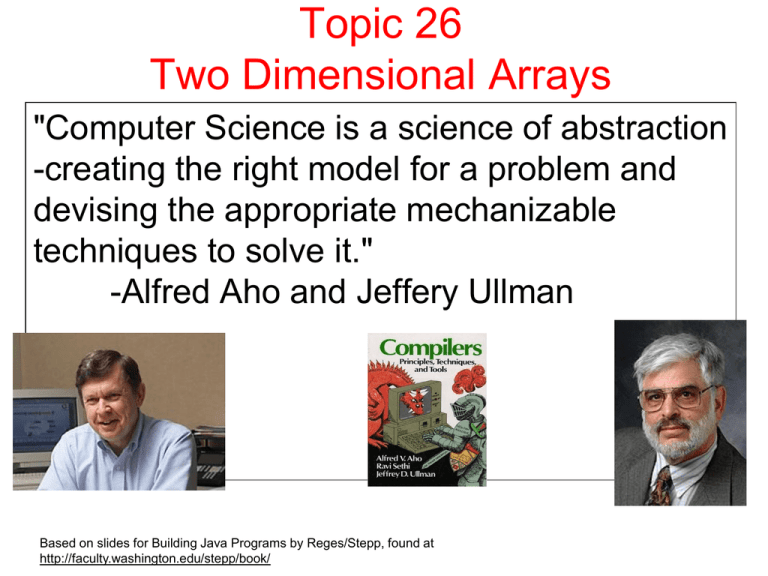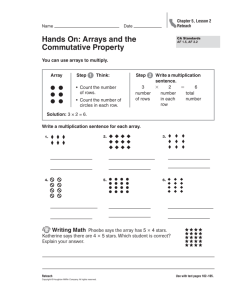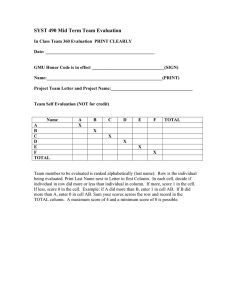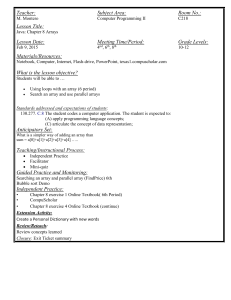Topic 26 Two Dimensional Arrays
advertisement

Topic 26 Two Dimensional Arrays "Computer Science is a science of abstraction -creating the right model for a problem and devising the appropriate mechanizable techniques to solve it." -Alfred Aho and Jeffery Ullman Based on slides for Building Java Programs by Reges/Stepp, found at http://faculty.washington.edu/stepp/book/ 2D Arrays in Java Arrays with multiple dimensions may be declared and used int[][] mat = new int[3][4]; the number of pairs of square brackets indicates the dimension of the array. by convention, in a 2D array the first number indicates the row and the second the column Two Dimensional Arrays 0 1 2 3 0 0 0 0 0 1 0 0 0 0 column 2 0 0 0 0 row This is our abstract picture of the 2D array and treating it this way is acceptable. (actual implementation is different) mat[2][1] = 12; What is What? int[][] mat = new int[10][12]; // mat is a reference to the whole 2d array // mat[0] or mat[r] are references to a single row // mat[0][1] or mat[r][c] are references to // single elements // no way to refer to a single column 2D Array Problems Write a method to mind the max value in a 2d array of ints Write a method that finds the sum of values in each column of a 2d array of doubles Write a method to print out the elements of a 2d array of ints in row order. – row 0, then row 1, then row 2 ... Write a method to print out the elements of a 2d array of ints in column order – column 0, then column 1, then column 2 ... clicker question What is output by the following code? String[][] strTable = new String[5][8]; System.out.print(strTable.length + " "); System.out.print(strTable[0].length + " "); System.out.print(strTable[2][3].length()); A. 40 0 0 B. 8 5 0 C. 5 8 0 D. 5 8 then a runtime error occurs E. No output due to a syntax error. Use of Two Dimensional Arrays 2D arrays are often used when I need a table of data or want to represent things that have 2 dimensions. For instance an area of a simulation Example of using a 2D array Conway's game of life – a cellular automaton designed by John Conway, a mathematician – not really a game – a simulation – takes place on a 2d grid – each element of the grid is occupied or empty Simulation http://conwaysgameoflife.appspot.com/ http://activeden.net/item/game-of-life/136281 www.ibiblio.org/lifepatterns/ Generation 0 0 1 2 3 4 5 0 . * . * . * 1 * . * * * * 2 . . * * . * 3 * * * . * . * indicates occupied, . indicates empty Or 0 0 1 2 3 1 2 3 4 5 Generation 1 0 1 2 3 4 5 0 . * . * . * 1 . . . . . * 2 . . 3 * . . . . . * * . . * indicates occupied, . indicates empty Or , Generation 1 0 0 1 2 3 1 2 3 4 5 Rules of the Game If a cell is occupied in this generation. – it survives if it has 2 or 3 neighbors in this generation – it dies if it has 0 or 1 neighbors in this generation – it dies if it has 4 or more neighbors in this generation If a cell is unoccupied in this generation. – there is a birth if it has exactly 3 neighboring cells that are occupied in this generation Neighboring cells are up, down, left, right, and diagonal. In general a cell has 8 neighboring cells Problem Implement a program to run the simulation
![CMPS 1053 - 2-Dimensional Array Problems 1. int A[50][7];](http://s2.studylib.net/store/data/010949140_1-6834a0202c0b10ad84c9231ae1d72800-300x300.png)



